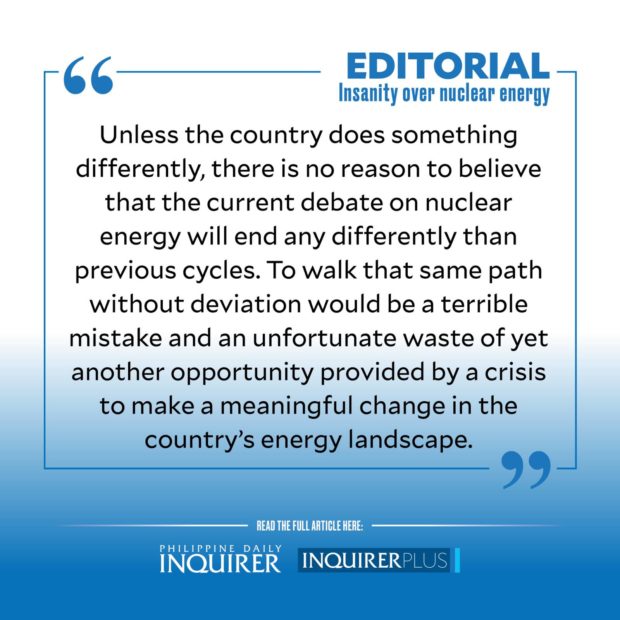Insanity over nuclear energy
Last week, representatives of the Philippine and United States governments announced an agreement to strengthen the “strategic civil nuclear cooperation” between both countries, with the goal of improving Filipinos’ energy security and nonmilitary use of nuclear power.
The deal dovetails right into President Duterte’s recent policy of including nuclear power in the country’s current mix of fossil fuels, hydro, wind, solar, and geothermal energy sources.
More importantly, it paves the way for the possible activation of the mothballed Bataan Nuclear Power Plant (BNPP) or other nuclear energy sources like small modular reactors being studied for countryside use.
Article continues after this advertisementWell and good. But it is often said that one definition of insanity is “doing the same thing over and over again, and expecting a different result each time.”
This is how the Philippines has been tackling the question of whether it should get into nuclear energy or not to help ease the high cost of electricity on everyday Filipinos.
It has been almost five decades since the local policymakers decided to explore the possibility of using nuclear power as a means of mitigating the effects of high energy prices on the lives of the country’s citizens.
Since the first “oil shock” of the early 1970s, the Philippine government has been looking at harnessing the power of the atom to provide cheap electricity to the growing needs of the country.
Everyone knows how the original BNPP exercise played out, with generations of Filipinos left footing the bill for a project that turned out to be a white elephant. But worst of all are the unanswered questions about the viability and safety of using nuclear power to generate electricity locally.
Almost 50 years after, nuclear power remains a hot button issue in Philippine politics, bought to generate heated and impassioned arguments from supporters, critics, and everyone in between.
That’s where the problem lies. The issue of nuclear power in the Philippines has become almost exclusively a political one, with voices of politicians from across the entire spectrum dominating the discussions.
Unsurprisingly, politicians are the most quotable of these voices and they invariably end up contributing to the raising of the temperature in the room for all stakeholders. At the end of every news cycle regarding the country’s “nuclear question”—and there have been many cycles throughout the years—nothing gets resolved, no action is taken, and the proverbial can simply gets kicked down the proverbial road, to be resurrected another day when convenient.
Today, the Philippines finds itself at another such time of convenience when it is fashionable to raise the possibility of reviving the BNPP itself or nuclear power in general amid the skyrocketing fuel prices that will inevitably lead to higher electricity prices in a few weeks’ time.
The Duterte administration has belatedly opened the doors to nuclear energy and the memorandum of understanding with the US government could provide us with important handholding while navigating unfamiliar waters, and the bonus of strengthening frayed bilateral ties in the process.
But unless the country does something differently, there is no reason to believe that the current debate on nuclear energy will end any differently than previous cycles. To walk that same path without deviation would be a terrible mistake and an unfortunate waste of yet another opportunity provided by a crisis to make a meaningful change in the country’s energy landscape.
The key to moving the discussion forward meaningfully is for Filipinos to listen to the voice of dispassionate and unbiased experts in the field of nuclear energy first before anyone else.
Philippine media can improve the quality of the debate by actively seeking out—not just locally, but also overseas—independent voices who are experts in the field including, but not limited, to nuclear power plant operations, environmental safety, and the business and economics of nuclear energy.
Only after the facts have been established by unbiased experts should we listen to the advocates of both sides. And after this, then the question of whether we should get into nuclear energy can be posed to the country’s political policymakers.
We have been doing the process the other way around for the last five decades. If we don’t change the way we are trying to solve this problem—if we persist in an insane repetition of what we’ve already done before—we should expect the same outcome to the quest for nuclear energy that we’ve had all these years: failure.

















